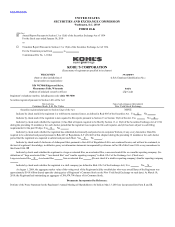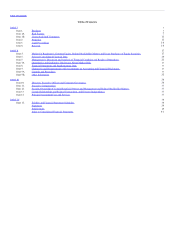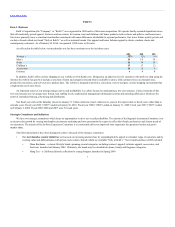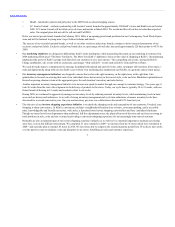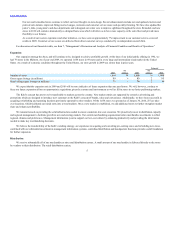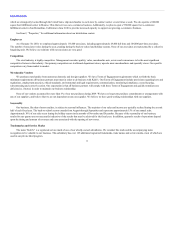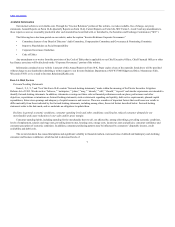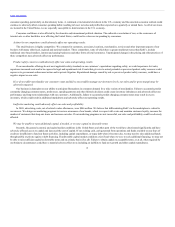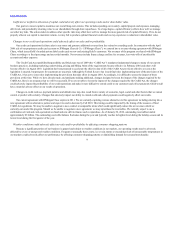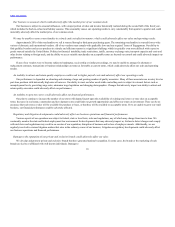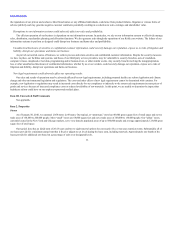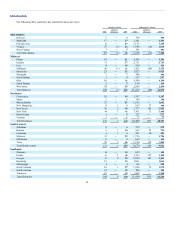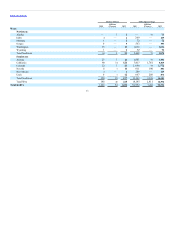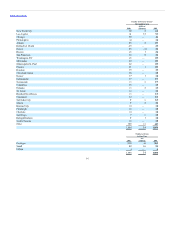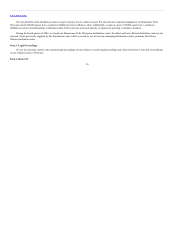Kohl's 2009 Annual Report Download - page 9
Download and view the complete annual report
Please find page 9 of the 2009 Kohl's annual report below. You can navigate through the pages in the report by either clicking on the pages listed below, or by using the keyword search tool below to find specific information within the annual report.
Table of Contents
Inefficient or ineffective allocation of capital could adversely affect our operating results and/or shareholder value.
Our goal is to invest capital to maximize our overall long-term returns. This includes spending on inventory, capital projects and expenses, managing
debt levels, and periodically returning value to our shareholders through share repurchases. To a large degree, capital efficiency reflects how well we manage
our other key risks. The actions taken to address other specific risks may affect how well we manage the more general risk of capital efficiency. If we do not
properly allocate our capital to maximize returns, we may fail to produce optimal financial results and we may experience a reduction in shareholder value.
Changes in our credit card operations could adversely affect our sales and/or profitability.
Our credit card operations facilitate sales in our stores and generate additional revenue from fees related to extending credit. In connection with the April
2006 sale of our proprietary credit card accounts to JPMorgan Chase & Co. (“JPMorgan Chase”), we entered into a revenue-sharing agreement with JPMorgan
Chase, which issues Kohl’s branded private label credit cards to new and existing Kohl’s customers. Net revenues of the program are shared with JPMorgan
Chase according to a fixed percentage and are settled monthly. Net revenues include finance charge and late fee revenues, less write-offs of uncollectible
accounts and other expenses.
The Credit Card Accountability Responsibility and Disclosure Act of 2009 (the “CARD Act”) mandates fundamental changes to many of our current
business practices, including marketing, underwriting, pricing and billing. Most of the requirements became effective in February 2010 and others will
become effective in August 2010. Legislation has been proposed to accelerate the effective date of all of the CARD Act provisions effective as soon as the
legislation is enacted, but prospects for enactment are uncertain. Although the Federal Reserve has issued final rules implementing most of the provisions of the
CARD Act, it has yet to issue rules implementing the provisions that take effect in August 2010. Accordingly, it is difficult to assess the impact of those
provisions at this time. While we have already made, and anticipate making additional, changes designed to lessen the impact of the changes required by the
CARD Act, there is no assurance that we will be successful. If we are not able to lessen the impact of the changes required by the CARD Act, the changes
could adversely impact the profitability of our credit operations and make it more difficult to extend credit to our customers and collect payments which would
have a material adverse effect on our results of operations.
Changes in credit card use, payment patterns and default rates may also result from a variety of economic, legal, social and other factors that we cannot
control or predict with certainty. Changes that adversely impact our ability to extend credit and collect payments could negatively affect our results.
Our current agreement with JPMorgan Chase expires in 2011. We are currently exploring various alternatives to this agreement, including entering into a
new agreement with an alternative partner and expect to reach a decision by Fall 2010. This timing could be impacted by the timing of the issuance of final
CARD Act regulations. We may be unable to negotiate a new contract at comparable terms which could significantly reduce the net revenues which we
currently earn under this program. Should we be unable to negotiate a new agreement, we may repurchase the receivables. We currently expect to use a
combination of cash and cash equivalents on hand and new debt to finance such a repurchase. As of January 30, 2010, outstanding receivables totaled
approximately $3 billion. The outstanding receivable balance fluctuates during the year and typically reaches its highest level during the holiday season and its
lowest level during the first quarter of the year.
Weather conditions could adversely affect our sales and/or profitability by affecting consumer shopping patterns.
Because a significant portion of our business is apparel and subject to weather conditions in our markets, our operating results may be adversely
affected by severe or unexpected weather conditions. Frequent or unusually heavy snow, ice or rain storms or extended periods of unseasonable temperatures in
our markets could adversely affect our performance by affecting consumer shopping patterns or diminishing demand for seasonal merchandise.
9

